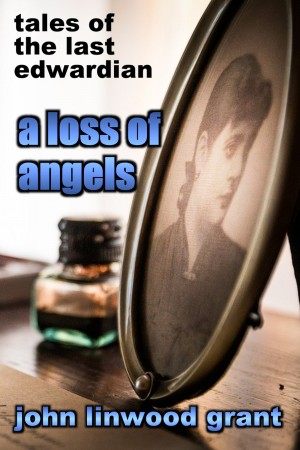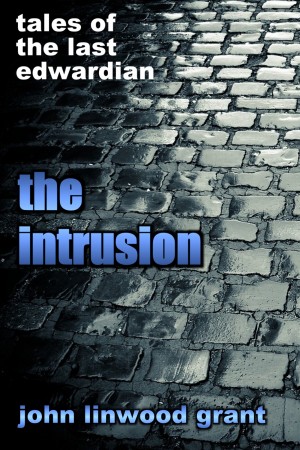Interview with John Linwood Grant
Published 2015-08-01.
Who are your favorite authors?
I tend to read one author for far too long, until I'm burned out, and then skip to something quite different. So I'll have sessions with authors like Neil Gaiman, Neal Asher and John Connolly (I like a sense of something strange, different), and then I'll go on to old school stuff - H P Lovecraft, M R James, William Hope Hodgson. My very favourite from long ago is E G Swain, whose gentle Reverend Batchel ghost tales have never been bettered. After that I want to bury myself in those wonderful observational stories by people like E M Delafield, E E Nesbit and E F Benson. Mapp and Lucia always hooks me, every time. Dorothy L Sayers is a perennial, as well.
What inspires you to get out of bed each day?
The dogs. If you have three dogs sleeping in the bedroom, there comes a time when one or all of them require food, walkies or just general attention. The latter involves being jumped on by at least one hyperactive lurcher and told that you should get going. After that, and at least two pints of hot tea, it's time to stare at last night's writing drafts and wonder how many beers you had.
When you're not writing, how do you spend your time?
Out with the dogs first. I work from home, so a lot of time's taken up by domestic duties. Cooking, pickling and baking, especially if I've found a new bread recipe (I'm obessed with what they now call artisan bread), or struggling against the massed hordes of slugs, snails, aphids, wood pigeons and general pests who try to strip our vegetable garden on a daily basis. If there's any time left, I listen to vast amounts of Old Time Radio, from early British radio comedies to US horror shows from the forties and fifties. These are especially good if they've left the original, and hilarious, advert slots in.
Do you remember the first story you ever wrote?
Absolutely. It was a tale of dinosaurs in the Antarctic, a hidden land discovered by an exploring party with sno-cats. I wrote it at primary school and illustrated it, as well, in a little booklet. For some unknown reason, I had a thing about these brilliant tracked vehicles that could cover the frozen land, and I just had to have a story about them. The dinosaurs and people were a bit irrelevant. The first story I remember writing as an adult was a complete fantasy novel based on heavily-adapted Mayan mythology, complete with myths, songs and a new monotheistic religion. The publishes said it was so detailed and built up that I was at risk of drowning my readers in an information flood.
Do you remember the first story you ever read, and the impact it had on you?
I have a nasty feeling that it was Pollyanna, by Eleanor Porter. It imbued me with the idea of always trying to see the good in something or someone. It's why I'm nice to strangers until they hit me, and to neighbours until they turn out to be grumpy bastards. The next story of any consequence was The Hobbit, which I read at a very early age and absolutely loved. Oddly enough, I find hobbits themselves really irritating. I watch the Lord of the Rings DVDs by skipping the hobbit-only chapters. What impacted on me was the sense of elven and dwarven history, and the suggestion of an enormous timeline. It started me off on my love of fantasy.
How do you discover the ebooks you read?
I listen to my friends, who all seem to be avid ebook readers and do less and less with the printed page. They read on the move, in the garden, in the pub, almost everywhere. Despite being much the same age as them, I still like the smell of a well-used paperback, so I'm fairly picky about ebooks. I like to have a word-of-mouth recommendation first.
What is your writing process?
I've never figured that one out. Often I come up with a title or phrase, and then write a story or novel based on those few words alone. I don't even know what the title means sometimes, only that it has something about it which triggers ideas. I even like writing stories which stem from titles other people suggest - it's the challenge, I suppose. If that's not the case, then the process is usually a long and sometimes futile struggle to find a vehicle for a character I've thought of (of which I've thought?). It starts with placing a character in a place, a situation, and then wondering what they would do. In technical terms, this means that I can occasionally produce dozens of variants, written directly onto the computer, none of which quite work. And then I lie on the floor and pencil in ideas for the last title I liked.
How do you approach cover design?
I like simple impact, and tend to look for images from the real world which can be adapted - a looming cliff, a lone tree, a ruin, rain-slick cobbles. I suppose that I want my stories to be rooted in the real world, however fantastical, occult or just plain unlikely they are. After that, selecting the image, it's usually about judging the font and text effects which do two things - stand out enough to be noticed, and don't jar with the imagery.
What is your e-reading device of choice?
8 inch tablet, a cheapie version I'm afraid!
What book marketing techniques have been most effective for you?
Definitely word of mouth. If you like it, you tell other people, simple as that.
Describe your desk
A total mess. Empty beer bottles, telephone, slug pellets, half-read books, pens which don't work, pieces of paper with story ideas, all piled up around my computer screen and keyboard.
Smashwords Interviews are created by the profiled author or publisher.
Books by This Author
A Loss of Angels
by John Linwood Grant
(5.00 from 1 review)
An appalling triple murder in Edwardian Manchester. The evidence is unchallenged, the confession sound. But before the hangman can do his work, an appeal is lodged. The guilty man was supposedly insane when he killed Edward, Eliza and Lucia Tallboys. Dr Alice Urquhart must establish the truth.
The Intrusion
by John Linwood Grant
Edwin Dry walks the streets of Edwardian London, with his coat neatly buttoned and his bowler hat at just the right angle. He is always available, and always delivers what is required. In his own way. But his latest venture brings complications. Others are there before him, with a different agenda from his own, and so is something far stranger, far darker than Mr Dry himself.


